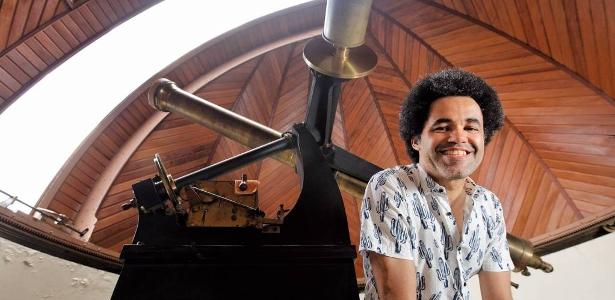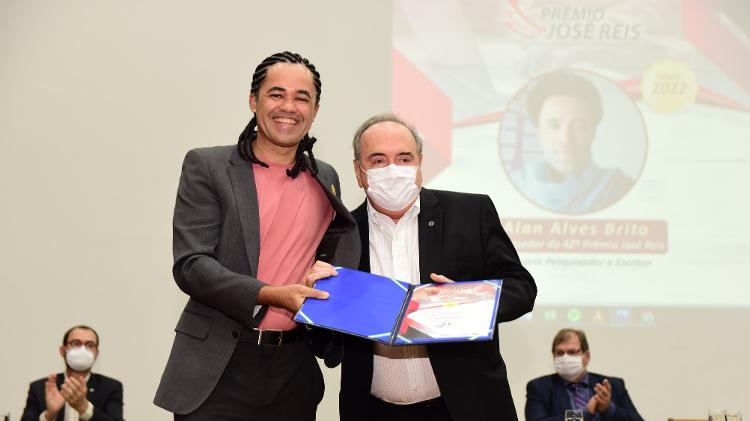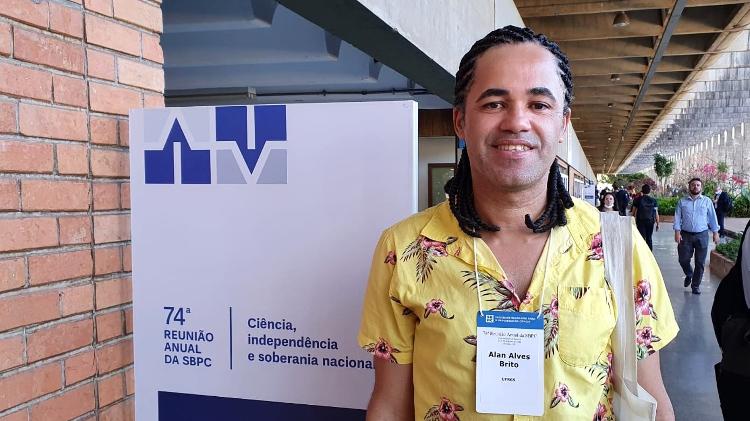Bahia astrophysicist Alan Alves Brito, 44, received last Sunday from CNPq (National Council for Scientific and Technological Development) the José Reis Prize for Scientific and Technological Publication 2022. The largest scientific event in the country, the annual meeting of SBPC (Brazilian Association for the Advancement of Science), in Brasilia.
Coming from Feira de Santana, in the semi-arid region of Bahia, the professor, researcher, scientific promoter, and writer is a vivid – and active – story of resisting those who carry with them stereotypes that still characterize prejudice in our country, such as being gay and black.
Since 2014, he has been a professor at UFRGS (Federal University of Rio Grande do Sul), working in stellar astrophysics. Without giving up his dialect from within Bahia, he became a reference in the region.
“Since I don’t like walls or cupboards, I decided to go into battle. I heard from Quilombola here: ‘There are doors that open only from the inside, you can’t give up.'” You have to be there to open those doors. “I get goosebumps whenever I remember. My commitment is ancestor,” he says.
Alan is the son of an illiterate man and a mother who has only a basic education. “I am the first generation in my family to go to university; the first to get a doctorate; the first to become a university professor,” he says.
Today, he helps the family who stayed in Bahia. His parents, after their retirement, decided to move to a house in the country to be closer to nature.
“My salary is divided, it was not only my salary [risos]. But for me that’s not the big question: the important thing is to make this movement, to be inside that space. Black bodies need to occupy the university.”
Supported by public policy
Thanks to the support of public institutions and policies, he received a doctorate in stellar astrophysics from the Institute of Astronomy, Geophysics and Atmospheric Sciences of the University of São Paulo (University of São Paulo).
Meanwhile, before passing the UFRGS competition, he was a visiting researcher in Portugal and Germany and did post-doctoral training in Chile and Australia.
It’s not easy to get to UFRGS in a country that kills blacks and gays. Many social signs have passed me by, but I know I didn’t come here on my own. I am the result of all the public policies behind me: public school, scholarships, college accommodation, and Chinese. If not, I wouldn’t be here.”
Alain Britto, astrophysicist
Today, Alan studies the chemical evolution of different star groups in the galaxy.
At university, he took on various roles that went beyond the Department of Astronomy at the Institute of Physics. “My life has completely changed. Before I was just a researcher, I got there as a teacher.”
Alan heads the Center for African, Afro-Brazilian and Indigenous Studies and is the deputy coordinator of the Astronomical Observatory at UFRGS. In addition, he is a member of the UFRGS Positive Social Policy Committee and was recently selected into the Fiocruz Scholar Communication Program (Fundação Oswaldo Cruz).
Founded in Porto Alegre, it decided to work to unify the flag with its Afro-descendant history. “I offer a perspective on how we’re talking about this astronomy in a multicultural way with black, African, and Quilombola cosmologists,” he says. “I want to spread astrophysics by decolonizing knowledge.”
My body adds many questions. these movements [de entrada na universidade] Make us part of the system, and I’m here to be able to resist and survive and survive in that space not prepared for me. This is also a disorder, and it has a very strong meaning for resistance.”
Alain Britto, astrophysicist
The column spoke with Alan during the SBPC meeting, where he led the conference “Oralituras: Scientific and Technological Disclosure to Postponing the Apocalypse,” a frank reference to original writer Ailton Krenak, author of “Ideias para Adiar o Fim do Mundo” (Ideias para Adiar o Fim do Mundo). )”.
He remembers that, as a child, he always dreamed of becoming an astronomer, and from a young age he worked in the field of scientific communication. “At the age of twelve, I was part of the Bahia’s Adolescent Health Program. At the age of thirteen, I started a science club for children,” he says.
In Feira de Santana, he says that he lived near an observatory and always wanted to become an astronomer. In 1996, he entered the UEFS (Universidade Estadual de Feira de Santana), where he graduated in Chemistry.
“Then I passed five postgraduate programs, but I chose the USP because I got a scholarship and student accommodation,” he says.
Since 2019, he has published eight books. The first, “Astrophysics for Basic Education: The Origin of the Chemical Elements in the Universe,” was a finalist for the Jabuti Prize in 2020 – the work was written in partnership with Neusa Teresinha Massoni.
For him, the dissemination and popularization of science is also a holistic process. He asserts, “All my books were created from my experiences. The truth is that we need dialogue and building another science together to postpone the end of the world.”
He complains that despite the progress in recent years, it is still necessary to darken the intellectual spaces. “In Brazil, 90% of university professors are white and, as a rule, are born men. Space for conflict for us.”
However, he emphasizes a point he considers essential: unite science and activity always in action. “It’s not just about doing something for the sake of being active,” he says. “I’m in graduate school, I write books, I publish articles, I advise students, and I publish science.”
Many of my colleagues do not need to do this, they only have articles in the specific areas to worry about. But I have other political demands: I have to be part of the committees within the university to see if positive social policies get where it needs to go, and I have to reconcile all of this with my career. This is struggle and resistance.”
Alain Britto, astrophysicist
The scientist says there is no reason to stop the fight for inclusion and that he is concerned about cutbacks in scholarships for permanence and student retention policies at universities.
“We got this space through a historical conflict, and the system gave us nothing. We need to keep fighting. Cuts are a project, a political choice to say, ‘We don’t want you here.'” “If you are. To conclude, here today, because of these policies, we cannot naturalize the absence of black bodies in the university, this place is strategic for us.”

“Wannabe internet buff. Future teen idol. Hardcore zombie guru. Gamer. Avid creator. Entrepreneur. Bacon ninja.”




